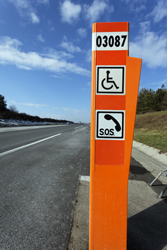Harmonising European emergency call services
Most drivers will know that sick feeling of witnessing an upturned vehicle on the side of the road. Maybe the engine is still running, maybe the occupants are still in the car. If you are the first on the scene, who do you call? Don't panic! In future, smart on-board emergency call (eCall) systems will automatically alert relevant emergency crews. The eCall in-car emergency system being implemented is designed to dial Europe's single emergency number 112 automatically in the event of a serious accident. It could save up to 2 500 lives per year in Europe when fully deployed. Telematics technology like this - combining telecommunications and informatics in vehicles - is increasingly common. And thanks to the eCall programme Europe's roads will be even safer. But it's taken a lot of work to reach this point, and quite a bit more for vehicle makers and telematics suppliers to come. One of the biggest challenges they have faced is the complexity of the systems needed, merging technological solutions with organisational and human-related ones. The E-merge project worked on bringing all the elements together to ensure the availability and functioning of built-in emergency call systems from any vehicle anywhere in Europe. It developed and tested a common approach to emergency call systems which helped Europe prepare the technical, organisational and business structure underpinning eCall. The European Commission has supported eCall-related research projects, such as E-merge and GST-rescue, to ensure the technology can work across borders. eCall is one of the priorities of the EU's 'Intelligent car initiative' and the 'Intelligent transport systems action plan' promoting the use of information and communication technologies to achieve smarter, safer and cleaner road transport. In a multi-cultural Europe, E-merge naturally had to tackle the language and cross-border differences to ensure a smooth and interoperable result. E-merge also looked to create added value by not only focusing on emergency call efforts, but also data like route information and high-speed warnings. In the early stages of the evolving emergency call initiative, the project successfully tested and validated the link between eCall systems and public safety answering points (PSAPs), as well as the link between PSAPs and the various service providers around Europe. The information to be sent through eCall also has to be standardised across Europe. E-merge did the groundwork for this, in cooperation with relevant emergency services, and with the aim of reducing response times to accidents. Thanks to this valuable contribution, European motorists can feel comfort in the knowledge that help will soon be on the way.







